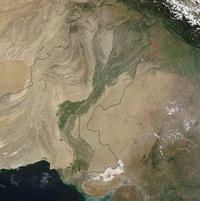The sage's transformation of the world arises from solving the problem of water. If water is united, the human heart will be corrected. If water is pure and clean, the heart of the people will readily be unified and desirous of cleanliness. Even when the citizenry's heart is changed, their conduct will not be depraved. So the sage's government does not consist of talking to people and persuading them, family by family. The pivot (of work) is water. -- Lao Tze
Water management is, by definition, conflict management. Water, unlike other scarce, consumable resources, is essential to all facets of society, from biologies to economies to aesthetics and spiritual practice. Moreover, it fluctuates wildly in space and time, its management is usually fragmented, and it is often subject to vague, arcane, and/or contradictory legal principles. There is no such thing as managing water for a single purpose -- all water management is multi-objective and based on navigating competing interests. Within a nation these interests include domestic users, agriculturalists, hydropower generators, those seeking recreation, and environmentalists. Any two of these groups are regularly at odds, and the chances of finding mutually acceptable solutions drop as more stakeholders are involved. Add international boundaries, and the chances decrease yet again.
Surface and ground water that crosses international boundaries presents increased challenges to regional stability, because hydrologic needs can often be overwhelmed by political considerations. While the potential for paralyzing disputes is especially high in these basins, history shows that water can also catalyze dialogue and cooperation, even between especially contentious riparian states. There are 263 rivers around the world that cross the boundaries of two or more nations, and untold number of international ground water aquifers. The catchment areas that contribute to these rivers comprise approximately 47 percent of the land surface of the earth, include 40 percent of the world's population, and contribute almost 80 percent of freshwater flow (Wolf et al. 1999).
Keep reading for free
Already a subscriber? Log in here .
Get instant access to the rest of this article by creating a free account below. You'll also get access to three articles of your choice each month and our free newsletter:
Subscribe for an All-Access subscription to World Politics Review
- Immediate and instant access to the full searchable library of tens of thousands of articles.
- Daily articles with original analysis, written by leading topic experts, delivered to you every weekday.
- The Daily Review email, with our take on the day’s most important news, the latest WPR analysis, what’s on our radar, and more.

